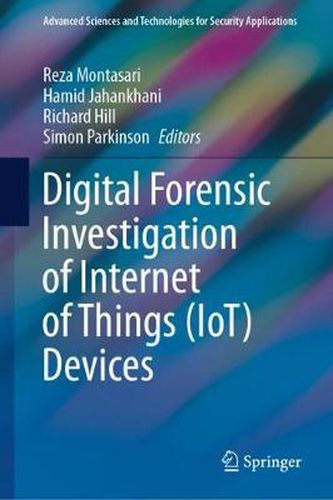Readings Newsletter
Become a Readings Member to make your shopping experience even easier.
Sign in or sign up for free!
You’re not far away from qualifying for FREE standard shipping within Australia
You’ve qualified for FREE standard shipping within Australia
The cart is loading…






This title is printed to order. This book may have been self-published. If so, we cannot guarantee the quality of the content. In the main most books will have gone through the editing process however some may not. We therefore suggest that you be aware of this before ordering this book. If in doubt check either the author or publisher’s details as we are unable to accept any returns unless they are faulty. Please contact us if you have any questions.
This book provides a valuable reference for digital forensics practitioners and cyber security experts operating in various fields of law enforcement, incident response and commerce. It is also aimed at researchers seeking to obtain a more profound knowledge of Digital Forensics and Cybercrime. Furthermore, the book is an exceptional advanced text for PhD and Master degree programmes in Digital Forensics and Cyber Security. Each chapter of this book is written by an internationally-renowned expert who has extensive experience in law enforcement, industry and academia. The increasing popularity in the use of IoT devices for criminal activities means that there is a maturing discipline and industry around IoT forensics. As technology becomes cheaper and easier to deploy in an increased number of discrete, everyday objects, scope for the automated creation of personalised digital footprints becomes greater. Devices which are presently included within the Internet of Things (IoT) umbrella have a massive potential to enable and shape the way that humans interact and achieve objectives. These also forge a trail of data that can be used to triangulate and identify individuals and their actions. As such, interest and developments in autonomous vehicles, unmanned drones and ‘smart’ home appliances are creating unprecedented opportunities for the research communities to investigate the production and evaluation of evidence through the discipline of digital forensics.
$9.00 standard shipping within Australia
FREE standard shipping within Australia for orders over $100.00
Express & International shipping calculated at checkout
This title is printed to order. This book may have been self-published. If so, we cannot guarantee the quality of the content. In the main most books will have gone through the editing process however some may not. We therefore suggest that you be aware of this before ordering this book. If in doubt check either the author or publisher’s details as we are unable to accept any returns unless they are faulty. Please contact us if you have any questions.
This book provides a valuable reference for digital forensics practitioners and cyber security experts operating in various fields of law enforcement, incident response and commerce. It is also aimed at researchers seeking to obtain a more profound knowledge of Digital Forensics and Cybercrime. Furthermore, the book is an exceptional advanced text for PhD and Master degree programmes in Digital Forensics and Cyber Security. Each chapter of this book is written by an internationally-renowned expert who has extensive experience in law enforcement, industry and academia. The increasing popularity in the use of IoT devices for criminal activities means that there is a maturing discipline and industry around IoT forensics. As technology becomes cheaper and easier to deploy in an increased number of discrete, everyday objects, scope for the automated creation of personalised digital footprints becomes greater. Devices which are presently included within the Internet of Things (IoT) umbrella have a massive potential to enable and shape the way that humans interact and achieve objectives. These also forge a trail of data that can be used to triangulate and identify individuals and their actions. As such, interest and developments in autonomous vehicles, unmanned drones and ‘smart’ home appliances are creating unprecedented opportunities for the research communities to investigate the production and evaluation of evidence through the discipline of digital forensics.